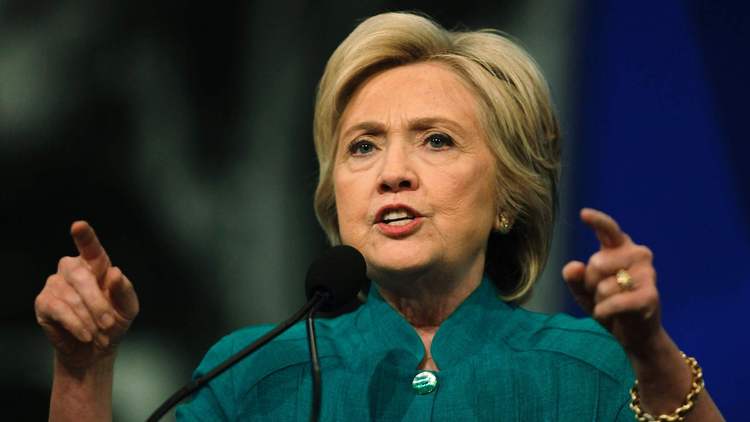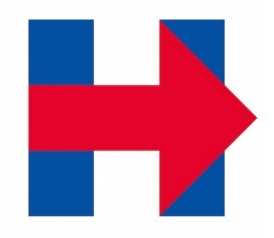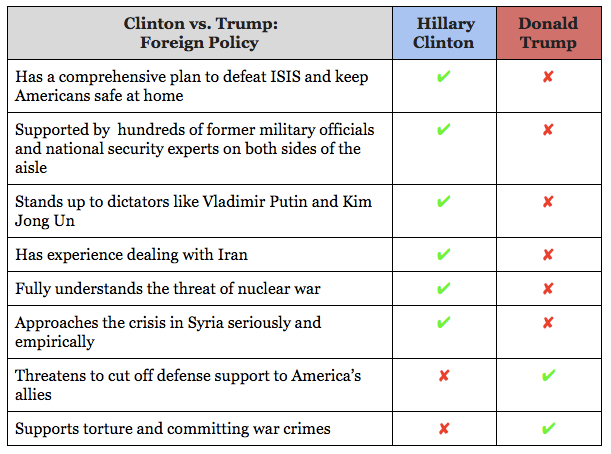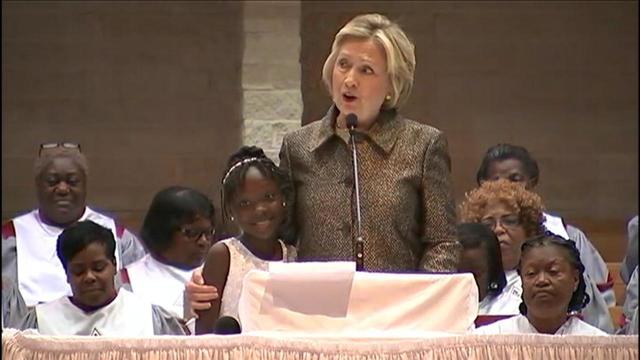
On Tuesday, Hillary Clinton was interviewed by Steve Harvey on an episode his radio show, “The Steve Harvey Morning Show.” During the interview, Clinton was asked about the recent shooting by police of an unarmed black man in Tulsa, Oklahoma. Clinton responded to the death of Terence Crutcher by asking, “How many times do we have to see this in our country?” She continued by speaking about the importance of proper police training saying, “There are good, honorable, cool-headed police officers. … We can do better. We have got to rein in what is absolutely inexplicable, and we’ve got to have law enforcement respect communities and communities respect law enforcement because they have to work together.” Download the full interview HERE.
A transcript of the interview is below:
STEVE HARVEY: Okay, well here we go. Joining me now – this is what I’ve been waiting on – is a dynamic Democratic Party candidate for the presidency of the United States. She served as the 67th United States Secretary of State from 2009 to 2013. She was born right here in Chicago, Illinois. Woohoo. Chi-town girl. She is a former First Lady of the United States. Who got that title? […] She’s a mother, she’s a grandmother, and we’re going to put her back in the White House, just flat out. Simply put.
SHIRLEY STRAWBERRY: Yes!
STEVE HARVEY: Nothing else will do. Please welcome to the show Mrs. Hillary Diane Rodham Clinton.
HILLARY CLINTON: Oh, Steve, hello!
SHIRLEY STRAWBERRY: Good morning.
HILLARY CLINTON: Hey, good morning, everybody.
STEVE HARVEY: How you doing?
HILLARY CLINTON: It’s so good to hear your voice.
STEVE HARVEY: You know what? I had you on my talk show, it was great there, and I told you I was going to get behind you and be a full supporter, and we’ve done just that – just that.
HILLARY CLINTON: Well, I really appreciate it because I know that you understand how high the stakes are in this election. It doesn’t get any higher, and we need everybody to get out and register and then vote because we’ve got to keep our country on the right track, and that’s under threat right now.
STEVE HARVEY: Yeah. Yeah, it absolutely is. Hey, we’re going to get into that right now. Now, let me ask you something kind of personal, though.
HILLARY CLINTON: Okay.
STEVE HARVEY: You and I are now both grandparents.
HILLARY CLINTON: Yes, just you and me.
STEVE HARVEY: Yeah, yeah, yeah. Yeah, we’re grandparents right now.
HILLARY CLINTON: Yes.
STEVE HARVEY: I’ve been struggling with what I want the grandkids to call me. I’ve already pitched one; Marjorie kind of shut it down. She is “Nana.” They call her “Nana.”
HILLARY CLINTON: Okay.
STEVE HARVEY: I wanted the grandkids to call me “Big Pimpin’.” [Laughter.] That got shot down.
HILLARY CLINTON: Yes, I’m with Marjorie on this one. [Laughter.]
STEVE HARVEY: Yeah, okay. Well, y’all women are always sticking together. So I got shot down, so I’m down to “Papa.”
HILLARY CLINTON: Yes, that’s —
STEVE HARVEY: What does your granddaughter Charlotte call you? What does she call you?
HILLARY CLINTON: Well, she calls me “Grandma” and she calls Bill “Pop-pop.”
STEVE HARVEY: “Pop-pop,” that’s cool.
HILLARY CLINTON: Yes.
STEVE HARVEY: That’s pretty cool.
HILLARY CLINTON: Yes.
STEVE HARVEY: And are you enjoying being a grandparent?
HILLARY CLINTON: Oh, it is the best thing in my life by such a country mile. There’s no comparison. I am so happy whenever I even get a picture or FaceTime and, oh, my gosh, if I get to see them. It just is transformational, Steve. I mean, there’s nothing like it.
STEVE HARVEY: Yeah, yeah.
HILLARY CLINTON: And really – it’s really about the future. I mean, you look at these little kids and you just want to hold them and protect them and love them and guide them, and you just want the country they’re growing up in to be everything it should be and the world to be peaceful and prosperous. I mean, it really does trigger all of these very deep thoughts when you’re around your kids.
STEVE HARVEY: Yeah. You know what? I would imagine that’s really what’s at stake here in this election. It’s really about the future and – but it’s also about right now. And what’s shaking us up in this whole candidacy is we’ve got to get America to understand exactly what you’re about here. And you do want what’s best for the country. How do you see this election going right now? Because you’re gaining momentum now because you – you had to take a short break for a minute because you were ill.
HILLARY CLINTON: That’s right.
STEVE HARVEY: And how is your health now? First of all, let me ask you that.
HILLARY CLINTON: It’s great. Thanks for asking. And yes, I’m back on the campaign trail.
STEVE HARVEY: Okay, so good. What separates you from Donald Trump? Let me ask you.
HILLARY CLINTON: Oh, my gosh. Can I have the whole hour? [Laughter.]
SHIRLEY STRAWBERRY: Take your time.
HILLARY CLINTON: I think it really comes down to our visions and our values. I have a vision where we continue to pursue equality and justice and opportunity for everybody, and that’s how I was raised. My mom had a really neglected life and yet she was able to, through the kindness of literally strangers, not her own family but teachers and others, to become a warm and loving parent and not be bitter; and my church, which gave me a lot of food for thought as they tried to make sure that I didn’t take any of my blessings for granted and understood to whom much is given much is required.
And then I was so fortunate because when I was in law school I met Marian Wright Edelman, who was the first African American woman to pass the Mississippi bar. She went down there and started working on behalf of kids and families, and she was close to Dr. King, she was close to Bobby Kennedy, and she formed the Children’s Defense Fund, and that gave me the opportunity to really see what we need to do – because I believe you’ve got to change both laws and hearts. We’ve got to change laws to protect people, to protect everything about them, and we’ve got to be a clear and loud voice for our society being what it should be: the city on the hill, striving for the more perfect union. And that’s my view, and I don’t think that’s how my opponent sees it.
When I went to defend young black kids put into adult jails in South Carolina, or went to Alabama undercover to expose racist segregated academies, or when I worked to get kids with disabilities the education they deserved, or stood up for women around the world who are often the last fed and ignored and marginalized, and everything that I believe in I want to bring to the White House. I want to build on the progress that President Obama has made during a very tumultuous time.
I mean, I’m appalled that Donald Trump will not apologize to the President and to the country for spending years questioning his citizenship and attempting to delegitimize him. And President Obama and Michelle Obama, they’ve kept their heads high. Like Michelle says, when they go low, we go high. And we’ve got to stay high. We’ve got to stay focused. And I know what we can do together to deal with more good jobs with rising incomes, making college affordable. I’ve got a plan for historically black colleges and universities because I value their work so much. And we’ve got to tackle systemic racism – this horrible shooting again. How many times do we have to see this in our country? In Tulsa, an unarmed man with his hands in the air? I mean, this is just unbearable, and it needs to be intolerable.
And so maybe I can, by speaking directly to white people, say, look, this is not who we are. We’ve got to do everything possible to improve policing, to go right at implicit bias. There are good, honorable, cool-headed police officers. We have seen them in action in New York over the last 48 hours because of the terrorist attacks. We can do better. We have got to rein in what is absolutely inexplicable. And we have got to have law enforcement respect communities and communities respect law enforcement because they have to work together.
So I have a big agenda.
[BREAK]
STEVE HARVEY: I want to say this to you. You’re speaking right now from your heart because this was not a prompted question about what happened on Friday to this gentleman. Nobody – I didn’t ask you any questions about HBCUs. I didn’t ask you the information that you know. This is a person that’s speaking from her heart. This is truly on the inside of you. This is what people have got to know about Hillary Clinton, that this is coming from within you. This isn’t prepped, started up. And we’re – that’s one thing we’re really looking for these debates on Monday because there will be no chance for everybody to get prepped. You will be and see pointblank from the heart of a person and mind what they really think and feel because there will be no teleprompting. You can’t fix it. I think Monday, Monday, we will see the real difference between these two candidates. And I think it will be a glaring difference.
HILLARY CLINTON: Well, I’ll tell you I am going to do my very best to communicate as clearly and – and fearlessly as I can in the face of the insults and the attacks and the bullying and bigotry that we’ve seen coming from my opponent. I can take it, Steve. I can take that kind of stuff. I’ve been at this. And I understand it’s a contact sport. But I’m not going to take what he says about everybody else –
STEVE HARVEY: Right.
HILLARY CLINTON: – his attacks on African Americans and immigrants and Muslims and women and people with disabilities.
STEVE HARVEY: Yes. There you go.
HILLARY CLINTON: It’s just –
STEVE HARVEY: There you go.
HILLARY CLINTON: It’s just something we cannot tolerate. And that’s why it’s so important for you and for everyone who has a platform in our country right now to really stand up and say, “This is not who we are.” And it’s important that all your – your listeners and your viewers on TV realize they cannot stay on the sidelines.
STEVE HARVEY: Right.
HILLARY CLINTON: Every issue they care about is at stake in this election. This is not, oh, a little here, a little there. We can – we can take it, no matter who wins. No. The next 50 days will determine the next 50 years. And I say that –
STEVE HARVEY: Wow.
HILLARY CLINTON: – absolutely seriously. And so I hope that everybody is encouraged to be sure you’re registered to vote. It’s simple. If you go to a site called iwillvote.com and enter your information, you can find out are you registered, where do you go to register because I need you. I need you –
STEVE HARVEY: Yeah.
HILLARY CLINTON: – people who believe as we believe and what we need to be doing in our country to make it better and make it fairer. We’ve got to stand up and be counted in this election.
STEVE HARVEY: Hey, let me tell you something. Ms. Clinton, you – you have our word here on The Morning Show we are going to see this thing through. We are pushing real hard for voter registration. The polls are not counting the right people. The polls are not counting all of us. And we are very well-aware of that. We supported President Obama. We heard his plea at the caucus meeting, what would mean the most to him if we got behind you. We’re not going to let you down. Be well on Monday. Be aggressive. If you say what you just said today, we’re going to hit it over the wall. But we’re behind you, Ms. Clinton.
HILLARY CLINTON: Yes.
STEVE HARVEY: And we wish you nothing but the best. But, more than that, we are going to the polls, and we are going to vote. Thank you so much.
HILLARY CLINTON: Thank you. Great to talk to you, Steve and everybody. Thanks a lot.
STEVE HARVEY: Absolutely. Thank you.
HILLARY CLINTON: Bye-bye.
For all the latest, follow our Scheduled Events page and follow Clinton on Twitter, Facebook, YouTube, and Instagram. Also, be sure to subscribe to the campaign’s official Podcast, With Her.
News Source: The Los Angeles Times, The Huffington Post








